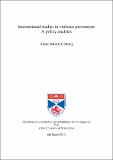Files in this item
International studies in violence prevention : a policy analysis
Item metadata
| dc.contributor.advisor | Donnelly, Peter Duncan | |
| dc.contributor.author | Morris Gehring, Alison | |
| dc.coverage.spatial | xv, 251 | en_US |
| dc.date.accessioned | 2014-02-26T16:26:31Z | |
| dc.date.available | 2014-02-26T16:26:31Z | |
| dc.date.issued | 2013 | |
| dc.identifier | uk.bl.ethos.595622 | |
| dc.identifier.uri | https://hdl.handle.net/10023/4470 | |
| dc.description.abstract | Violence is a leading cause of death and disability worldwide. Drawing on the disciplines of Political Science and Public Health the purpose of this study is to understand the conditions that determine political traction for the issue of violence and facilitate the adoption of a strategy of prevention. Using multiple-case study methodology, it draws on data collected from 42 in-depth semi-structured interviews, eight weeks of direct observations and more than 200 pieces of documentary evidence to examine violence prevention policy development in the Western Cape Province of South Africa, Jamaica and the Republic of Lithuania. The Shiffman Public Health Policy Priority Framework is applied to identify the factors that influenced the advancement of violence prevention policy in each case and to draw cross-case comparisons. The employment of this public health specific framework in the field of violence prevention allows the study to reach conclusions as to the utility of this framework for broader public health policy analysis and to proffer some refinements. Further findings suggest that bringing together academics, advocates and policy- makers into networks, focused on a shared concept of violence, gains political traction for the issue of violence and a strategy of prevention. It is found that the conceptualisation of violence and perception of prevention are framed in a case specific historical context and that an examination of this context is necessary to understand the conditions that shape the status of violence prevention policy. The results suggest that the development of violence prevention policy in other countries would be expedited by the coalescing and informed engagement of the violence prevention policy community in the web of institutions, interests and ideas that underpin the public health policy process. | en_US |
| dc.language.iso | en | en_US |
| dc.publisher | University of St Andrews | |
| dc.subject.lcc | HM1116.M7 | |
| dc.subject.lcsh | Violence--Prevention--Government policy--South Africa--Western Cape--Case studies | en_US |
| dc.subject.lcsh | Violence--Prevention--Government policy--Jamaica--Case studies | en_US |
| dc.subject.lcsh | Violence--Prevention--Government policy--Lithuania--Case studies | en_US |
| dc.title | International studies in violence prevention : a policy analysis | en_US |
| dc.type | Thesis | en_US |
| dc.type.qualificationlevel | Doctoral | en_US |
| dc.type.qualificationname | PhD Doctor of Philosophy | en_US |
| dc.publisher.institution | The University of St Andrews | en_US |
This item appears in the following Collection(s)
Items in the St Andrews Research Repository are protected by copyright, with all rights reserved, unless otherwise indicated.

